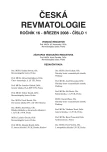-
Medical journals
- Career
Gitelman syndrome with chondrocalcinosis in adult age – case report
Authors: P. Horák 1; N. Jeck 2; Z. Fryšák 1; J. Zadražil 1
Authors‘ workplace: III. interní klinika FN a LF UP Olomouc, 2Kinderklinik, Universität von Marburg 1
Published in: Čes. Revmatol., 16, 2008, No. 1, p. 30-33.
Category: Case Report
Overview
The authors present a case of 56 years old female patient with anamnestic pain in knee joints, cramps and limbs paresthesia, with detected steady low serum levels of potassium and magnesium and metabolic alkalosis. High renal losses of both elements as well as hypocalciuria were detected. Radiographic examination gave evidence of knee joints chondrocalcinosis. Genetic examination proved the presence of homozygous point mutation in exon 10 of gene SLC12A3, which leads to change of glycine to serine at position 439 of cotransport protein NCTT. This mutation has already been repeatedly described in Gitelman syndrome. Gitelman syndrome comes under tubulopathies causing hypokalemia and is related to Bartter syndrome. Both diseases are linked to hypokalemia, renal losses of potassium, metabolic alkalosis and the activation of renin-angiotensin-aldosterone axis. In contrast to Bartter syndrome, the individuals with Gitelman syndrome have significant hypomagnesemia, hypermagnesiuria, hypocalciuria and milder clinical development with manifestation in higher age. The possible link between this syndrome and chondrocalcinosis appears interesting for a rheumatologist. In case of mentioned female patient, the therapy based on primarily massive parenteral, subsequently continual peroral substitution of potassium and magnesium and application of spironolactone and indomethacin led to total clinical symptom reduction and partial correction of laboratory values.
Key words:
Gitelman syndrome, hypokalemia, hypomagnesemia, chondrocalcinosis
Sources
1. Mastroianni N, Bettinelli A, Colussi G, et al. Novel molecular variants of the Na-Cl cotransporter gene are responsible for Gitelman syndrome Am J Hum Gen 1996; 59 : 1019-1026.
2. Ismail HM, Jagadeesch T. Gitelman’s syndrome. J Royal Soc Med 2002; 92 : 299–300.
3. Gitelman HJ, Graham JB, Welt LG. A new familial disorder characterized by hypokalemia and hypomagnesemia. Trans Assoc Am Physic 1966; 79 : 221–235.
4. Kamel KS, Oh MS, Halperin ML. Bartter’s, Gitelman’s, and Gordon’s. Syndromes. Nephron 2002; 92, Suppl. 1 : 18–27.
5. Peters M, Jeck N, Reinalter S, et al. Clinical presentation of genetically defined patients with hypokalemic salt-losing tubulopathies. Am J Med 2002; 112 : 183–190.
6. Warnock DG. Renal genetic disorders related to K(+) and Mg(+). Ann Rev Physiol 2002; 64 : 845–876.
7. Brennan TMH, Landau D, Shalev H, et al. Linkage of infantile Bartter syndrome with sensorineural deafness to chromosome 1p. Am J Hum Gen 1998; 62 : 355–361.
8. Watanabe S, Fukumoto S, Chang H, et al. Association between activating mutations of calcium-sensing receptor and Bartter’s syndrome. Lancet 2002; 360 : 692–694.
9. Reissinger A, Ludwig M, Utsch B, et al. Novel NCCT gene mutations as a cause of Gitelman’s syndrome and a systemic review of mutant and polymorphic NCCT alleles, Kidney Blood Press Res 2002, 25 : 354–362.
10. Maki N, Komatsuda A, Wakui H, et al. Four novel mutations in the thiazide-sensitive Na-Cl co-transporter gene in Japanese patients with Gitelman’s syndrome. Nephrol Dial Transplant 2004; 19 : 1761–1766.
Labels
Dermatology & STDs Paediatric rheumatology Rheumatology
Article was published inCzech Rheumatology

2008 Issue 1-
All articles in this issue
- Influence of supervised physical therapy on spinal mobility and pain in patients with ankylosing spondylitis
- Cytokines BAFF (B-cell activating factor) and APRIL (a proliferation-inducing ligand) and their role in autoimmune diseases
- Antibodies directed against complement components and systemic lupus erythematosus
- Idiopathic retroperitoneal fibrosis: Less common cause of low back pain. Use of tamoxifen in the treatment of the diesease
- Gitelman syndrome with chondrocalcinosis in adult age – case report
- Czech Rheumatology
- Journal archive
- Current issue
- Online only
- About the journal
Most read in this issue- Antibodies directed against complement components and systemic lupus erythematosus
- Idiopathic retroperitoneal fibrosis: Less common cause of low back pain. Use of tamoxifen in the treatment of the diesease
- Influence of supervised physical therapy on spinal mobility and pain in patients with ankylosing spondylitis
- Cytokines BAFF (B-cell activating factor) and APRIL (a proliferation-inducing ligand) and their role in autoimmune diseases
Login#ADS_BOTTOM_SCRIPTS#Forgotten passwordEnter the email address that you registered with. We will send you instructions on how to set a new password.
- Career

